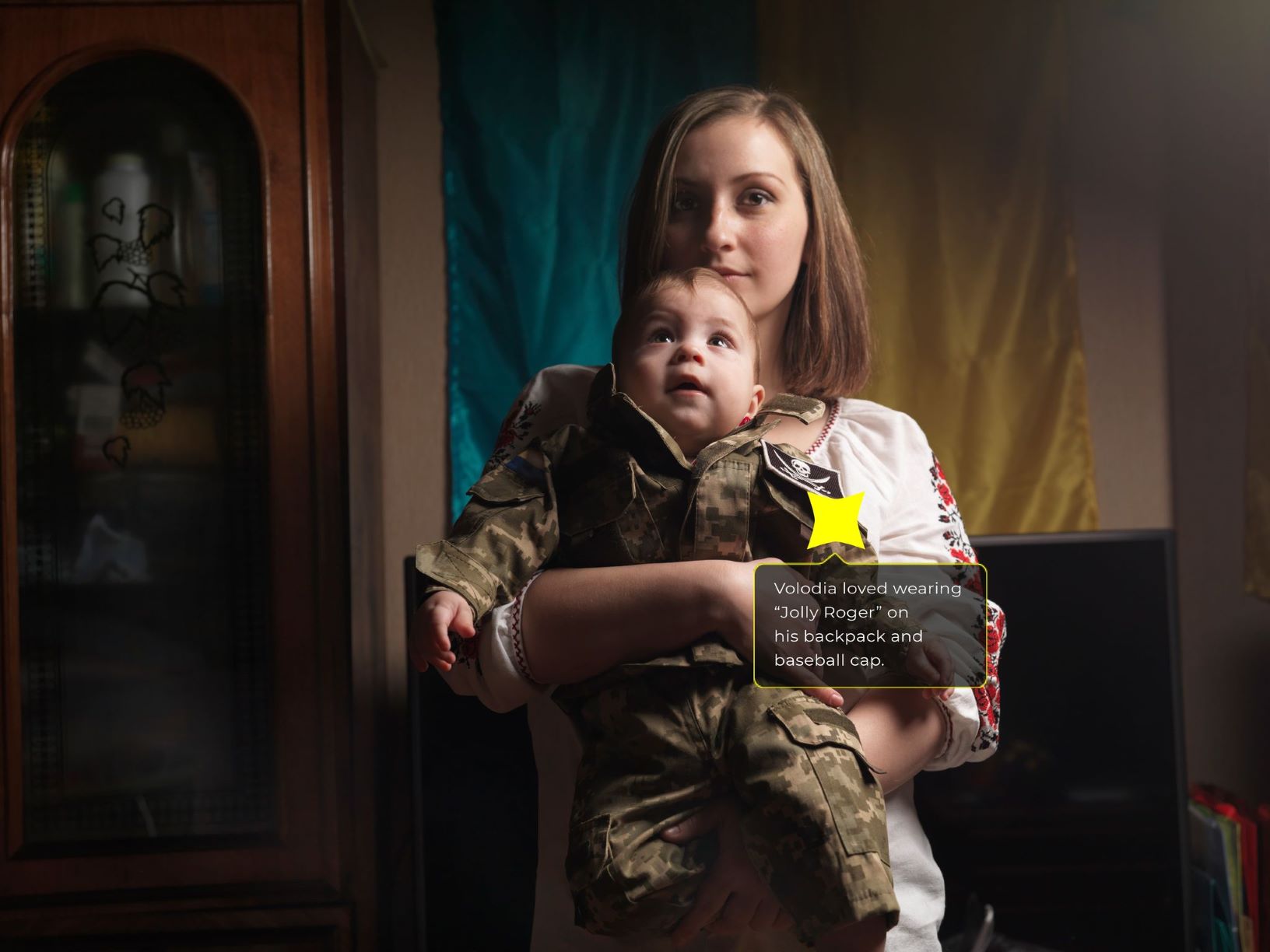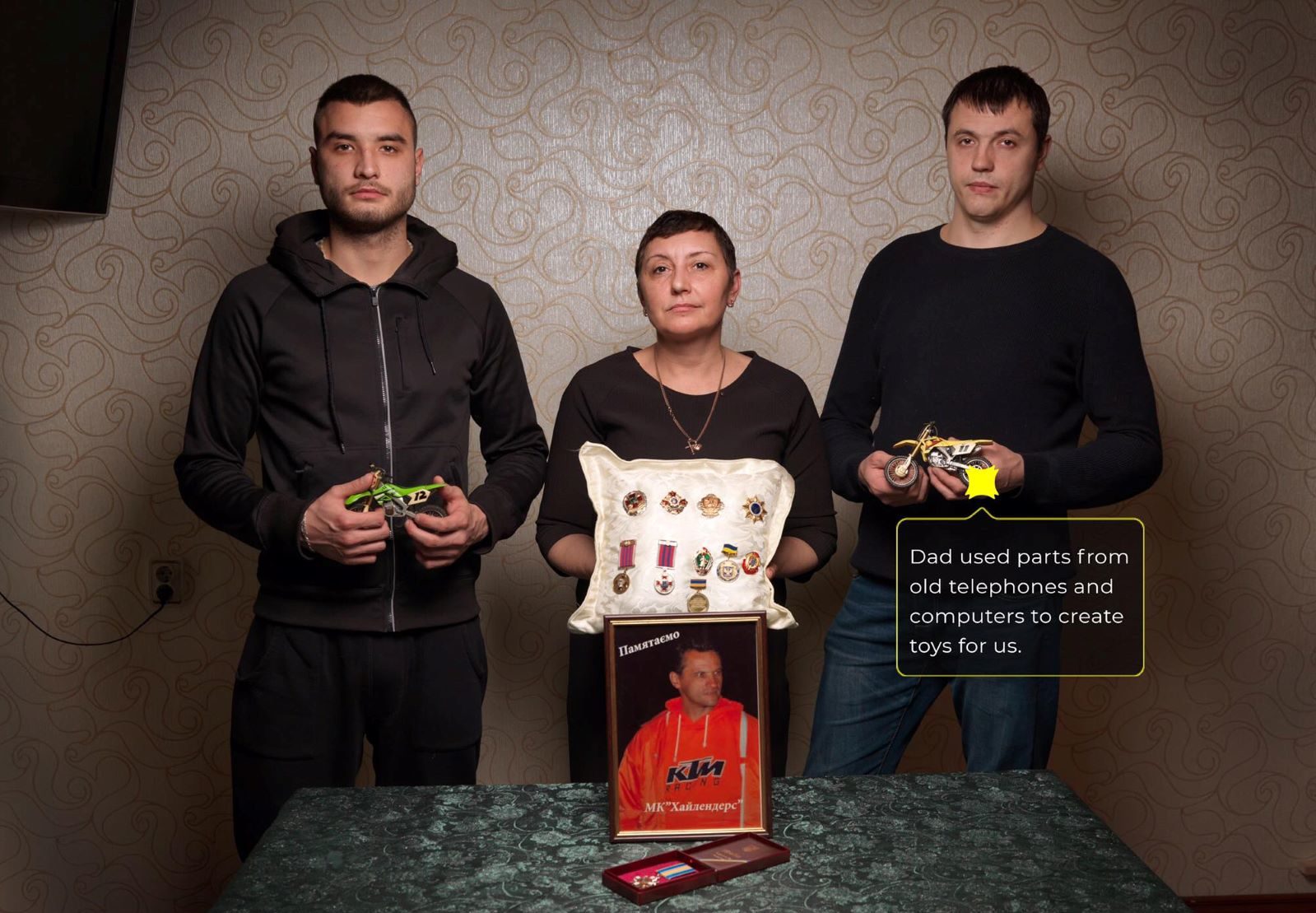Roman was killed on August 29, 2014 during the retreat from the Ilovaisk hellhole. A so-called “green corridor” was established by pro-Russian militants to allow trapped Ukrainian soldiers to leave Ilovaisk. But, amid the withdrawal, Russian paratroopers ambushed Roman’s unit near the village of Horbatenko. Seven other comrades also died.
Roman and his comrades were buried by locals in the Horbatenko cemetery. On September 15, 2014, Roman’s body was exhumed and taken to a laboratory in Zaporizhzhia by the Evacuation-200 team (Black Tulip Mission – an organization working to find and identify bodies of missing soldiers from the war in eastern Ukraine) for DNA analysis and identification.
It is part of the Plus 1 project created to memorialize the fallen Defenders of Ukraine.
Our compatriot Roman Nabiehov
Authors: Kapranov Brothers
We know nothing about Ukrainians.
We, Ukrainians, know nothing about ourselves.
Back in the spring of 2013, we actually believed that we’d have to put up with Yanukovych forever. We were disappointed, we were gullible, we valued a comfortable life more than freedom. Ukrainians “will panic, clutch at their heart, start swearing, or grab their purse strings, but they will never take up arms,” wrote Ukrainian poet Lina Kostenko, and we agreed with her statement. Because really, are Ukrainians capable of doing something worthwhile?
Suddenly, literally in one day, we became different. We stood on the Maidan, grabbed our weapons, and headed to the front as volunteers. Can an entire nation change in an instant? Of course not. We just don’t know what Ukrainians are really like.
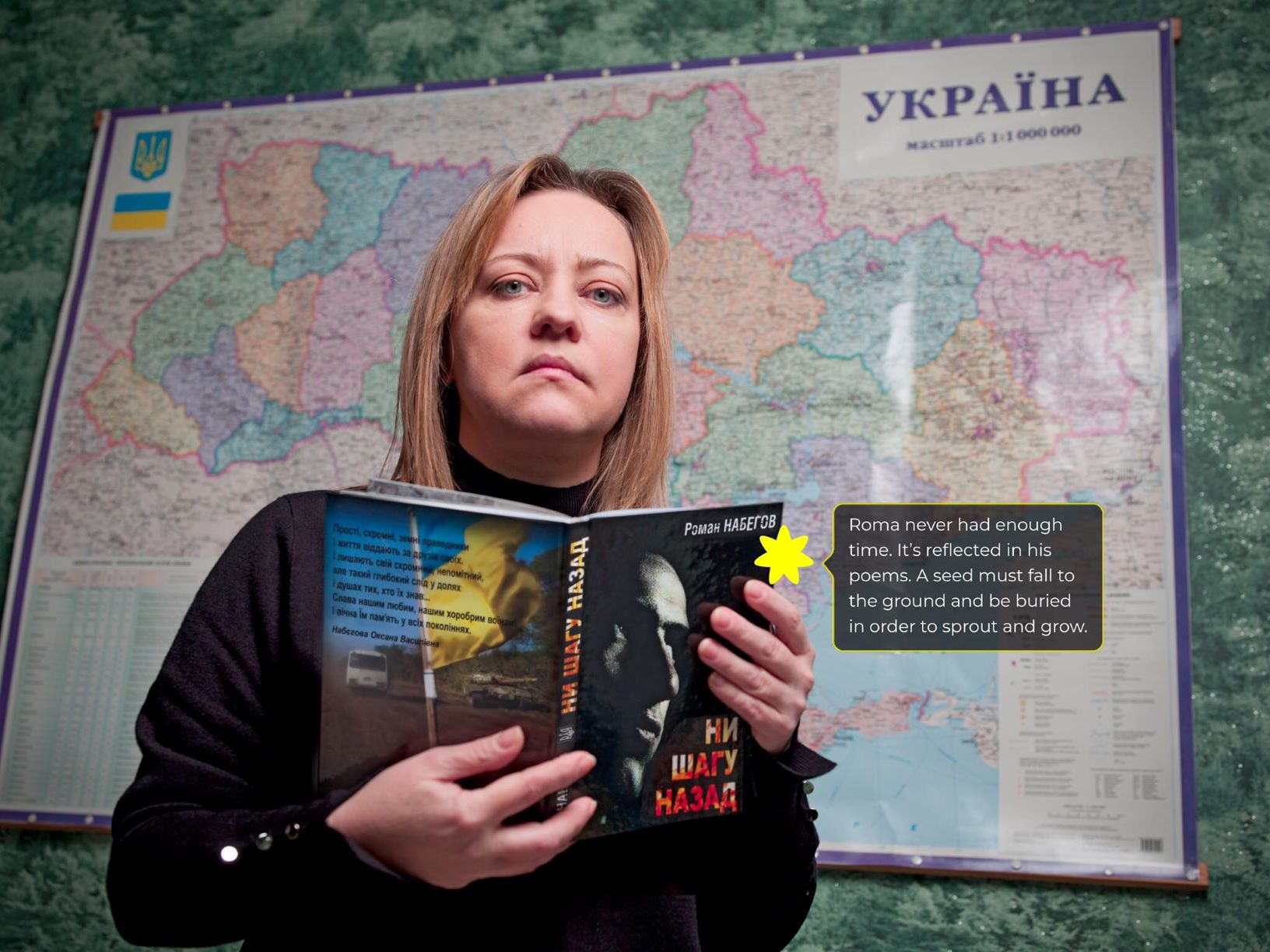
We look at a photo of Roma Nabiehov and we can’t help thinking again that we don’t know what Ukrainians are like... people from Kherson, for example. We don’t know anything about people who live in Kherson. Our information space teems with misconceptions about the special character of Russian-speaking south-eastern Ukraine, a post-Soviet and potentially dangerous region constantly tuned to Russian television. We’re also from southern Ukraine, from Ochakiv, a few kilometres from Roman’s Kherson, so we sense this mistrust, and we don’t trust ourselves.
 Roman Nabiehov was a policeman and an investigator in the Regional Police Department. We don’t know much about the police, or maybe we know them all too well. We know that the Ukrainian police force is an organized criminal group, that they falsify cases in order to squeeze money from individuals, business and real estate. Blackmail, fraud, slander, torture - these are the weapons used by police officers, and certainly not a gun in a holster.
Roman Nabiehov was a policeman and an investigator in the Regional Police Department. We don’t know much about the police, or maybe we know them all too well. We know that the Ukrainian police force is an organized criminal group, that they falsify cases in order to squeeze money from individuals, business and real estate. Blackmail, fraud, slander, torture - these are the weapons used by police officers, and certainly not a gun in a holster.
But suddenly… a note: “All I ask of you is the chance to work as an honest and decent police officer and fight for my country!” These words were written by Roman in a letter addressed to the Minister of Interior Arsen Avakov after he’d been refused four (!!!) times to serve in the ATO zone. Yes, read it again: “an honest and decent police officer”. Roman asked to be transferred not to a resort or to a warm and comfortable place, but to the trenches of the war zone.
We know nothing about Ukrainians. So, in order to understand our nation and our people, we must look into Roman’s face.
We were lucky. Roman Nabiehov’s mother collected all his notes – his diary, poems, journal and literary essays - into one book, which will allow us to look into his heart, to feel what cannot be grasped by the human brain.
Roman Nabiehov, a policeman from Kherson, is deployed to the ATO zone to fight for Ukraine. He joins the Myrotvorets Police Battalion and takes part in the liberation of Sloviansk and Dzerzhynsk. Ordinary police work - routine patrols, checkpoints, searches for separatists. When the battalion is sent to Ilovaisk, half of his comrades refuse to go to this hellhole, because they’re not soldiers, but policemen. Roman again volunteers to remain in the battalion. At first, he wrote four applications to the Ministry of Internal Affairs requesting to be transferred to the anti-terrorist operation, then - a letter to Minister Avakov, and finally his last choice - Ilovaisk… and war.
Patriotism is an obsolete word. Too often it’s used for other purposes. In one of his poems, Roman writes: “I’m for Ukraine. I will die if needed!” But, writing is one thing, while acting on your words is another…
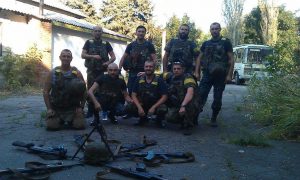
An ordinary man from Kherson that you might meet on a dusty summer street or in a pub performing karaoke. You wouldn’t even notice him. He didn’t stand out at school, except that he kept to himself, which is typical of people born under the Scorpio sign. He was kind and athletic, but nothing more. He completed his military service in the Navy. He didn’t try to get out of it, which is probably unusual… and we agree. It was indeed a strange decision for a young man to make in the early 2000s. However, Roman wanted to work in the police, so military service was mandatory.
Roman’s autobiography, written in 2013, contains some strange thoughts:
“During my service, I’d wake up and lie near the sea. This may have inspired me to write poetry… It was in Sevastopol that I started reading classical literature and, fascinated by Lermontov’s work, I wrote my first poems.”
Police officers don’t usually mention Lermontov or their own poems. But, Roman goes even further, and lists the writers that he read at the time: Mikhail Bulgakov, Antoine de Saint-Exupéry, William Shakespeare and Patrick Süskind. He admits that he wasn’t particularly interested in books at school, but this changed in the Navy.
 By the way, most of Roman’s poems are written in Russian, and this is quite understandable, given the influence of Lermontov, his Russian-language schooling, his Russian-speaking family, television and the atmosphere of the 2000s. What’s not clear is Roman’s reason for writing in Ukrainian. Maybe we don’t actually know Kherson?
By the way, most of Roman’s poems are written in Russian, and this is quite understandable, given the influence of Lermontov, his Russian-language schooling, his Russian-speaking family, television and the atmosphere of the 2000s. What’s not clear is Roman’s reason for writing in Ukrainian. Maybe we don’t actually know Kherson?
Truly, we don’t know much. We were in Kherson in the spring of 2014, when guns and tanks were being deployed along the isthmus of Perekop and fields were being mined to protect against possible Russian attacks from occupied Crimea. We were standing on the square in front of the regional state administration building, and residents told us how separatists had arrived in order to seize the building and instate “a people’s governor”, as had happened in Mykolayiv and Odesa. But here, Kherson residents, armed with hunting rifles, took up positions at windows and announced that they would fire without warning. So, the separatists ran around in circles in confusion, even though they were all armed with machine guns. Then, locals cornered them in the city streets, took away their weapons and handed them over to the newly-created self-defence units.
No, Roman was not in the administration building. But, there were hundreds of other Kherson locals, just like him, people who didn’t believe in themselves yesterday, and suddenly, literally in one day, became decent citizens and Ukrainians.
“I wrote a request to be transferred to the ATO zone… I don’t understand why a 20-year-old man, who has a wife and small children, has to die in the war. Here I am, a 28-year-old single policeman, who has sworn allegiance to Ukraine and the Ukrainian nation, sitting in my office and printing an interrogation report concerning a drunkard who stole two bowls,” wrote Roman in a letter.
During the Maidan, he wrote the following lines addressing the police protecting Yanukovych:
“You haven’t read a single book in your lives, but you know what ordinary people are like; they have to steal and pay bribes to make their lives more comfortable. Nobody needs Europe here. A sort of legal chaos is needed. Cunning jackals! People who are now on the Maidan are fighting for what means death for you. Resist, fight; don’t let the people win! Otherwise, they’ll create a better country than in Europe, where laws will be applied and there will be no corruption. It will destroy you, destroy your world. You must fight! Steal, pay bribes, don’t read books! God forbid that you understand what the word Motherland really means!”
A common thread runs through Roman’s writing: “they never read books.”
Books. This is where Roman seeks the truth… and finds Ukraine, his own unique Ukraine.
One can only thank Roman’s mother, Oksana, for compiling everything she found in her son’s computer - notes, reflections, drafts, finished and unfinished poems, which reveal a unique train of thought – Man’s understanding of his place in the universe. Clumsy words sometimes convey more than polished, edited literary works. Man as a source of energy, Planet Earth – an information space, I am, Declaration of love, Why is hazing still allowed? (hazing is called the “law of the grandfather” in former Soviet countries-Ed), Public associations and organizations - the future of a democratic Ukraine , Does God exist? – these are what Roman calls his notes, and he actually writes about the same things in his poems: love, mysticism, history and Ukraine.
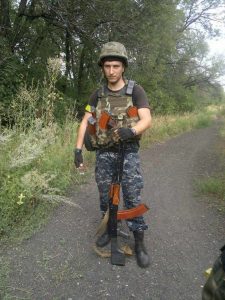 Roman’s comrades-in-arms recall that he wasn’t very forthcoming. He was given an eloquent call sign in the battalion – “Shaman”, but in his works he opens up completely, because he wrote for himself.
Roman’s comrades-in-arms recall that he wasn’t very forthcoming. He was given an eloquent call sign in the battalion – “Shaman”, but in his works he opens up completely, because he wrote for himself.
Such a person becomes a policeman (in Ukrainian, when we write “police”, we really mean “corruption”). Didn’t he know where he was going? Yes, he knew. There are notes which show that he thinks, why the police is what it is, and how different it is from what it should be. An idealist… Do you actually believe that idealists exist today?
We read Roman’s words and try to understand what he’s saying. Why have we decided that now is not the time for idealists? Why do we think that a policeman cannot be a decent person? Why don’t we believe in sincere patriotism… until a person sacrifices his life for Ukraine?
Pathos is false and boring. Pathos is usually used to fill a void. And so, everything looks simple. He wrote: “I stand for Ukraine. I’ll die for my country if I have to!”…and when it was necessary, he perished. The strong word of a Man. He promised and he did it. No fanfare, no close-ups and no foreboding music.
Roman was killed during the retreat from Ilovaisk, in the so-called “green corridor” set up by the Russian occupation forces. The bus carrying the Ukrainian soldiers was ambushed. Roman, who was sitting with a machine gun on the stairs, was the first to jump out and open fire. He was instantly mowed down by shrapnel. His death was not accidental; his death was heroic. We can say that it was voluntary, because he didn’t have to do it; he could have taken cover… but he didn’t.
 It so happened that on the Maidan we met the medic who served in the Myrotvorets Battalion - Vsevolod Stebliuk, the man who managed to evacuate dozens of wounded soldiers from the Ilovaisk hellhole in his famous vehicle called “Zhuzha”. Vsevolod told us a lot about those days near Ilovaisk, about hope and despair, fear and courage, about betrayal and self-sacrifice. That’s why we understand that it was thanks to men like Roman that other fighters were saved, men who took the initiative and gave others a chance to survive. It was they who upset the Kremlin’s plan for the rapid extermination of helpless soldiers and launched a bloody, tragic battle fought by a real army.
It so happened that on the Maidan we met the medic who served in the Myrotvorets Battalion - Vsevolod Stebliuk, the man who managed to evacuate dozens of wounded soldiers from the Ilovaisk hellhole in his famous vehicle called “Zhuzha”. Vsevolod told us a lot about those days near Ilovaisk, about hope and despair, fear and courage, about betrayal and self-sacrifice. That’s why we understand that it was thanks to men like Roman that other fighters were saved, men who took the initiative and gave others a chance to survive. It was they who upset the Kremlin’s plan for the rapid extermination of helpless soldiers and launched a bloody, tragic battle fought by a real army.
We know nothing about Ukrainians. We, Ukrainians, know nothing about ourselves. Only in the face of death can we finally answer all the questions.
When you read Roman’s notes, you have the impression that you know this man. Maybe because in each of his words you see your own words, and in each of his thoughts you look for your own. Or maybe because we are compatriots, people from the South, our hair burnt by the summer sun, our lungs full of the steaming air of the steppes, with the Dnipro flowing through our veins, with eternal questions in our blue eyes.
He searched for himself and found Ukraine.
He searched for the truth and found his Homeland.
He paid the highest price, and passed it on to us.
Now, it’s Roman Nabiehov’s Ukraine:
Love Ukraine! She will not forget you,
Love Ukraine, your soul will feel calm, - he pleads with youthful sincerity from the distant, peaceful year 2008. We hope that his soul is at rest now, because Roman proved that his love for Ukraine was absolute.

The project is built around 22 individual exhibition stands. In iconic and powerful moments captured by a photographer’s camera – Youry Bilak, a Frenchman of Ukrainian descent – Ukrainian families tell the stories of their loved ones – Ukrainian soldiers who perished in the war. Each narrative, each individual is but one small grain, one tiny unit of a module in a living organism. By telling his story, we bring him back to life.
Each family chose an object that most reminds them of their departed: a father’s jacket, a guitar, a suit of medieval armour, a book. These family artifacts reflect a living continuation of the departed loved one. Ukrainian artists, intellectuals, and journalists were invited to create original texts about each soldier.




